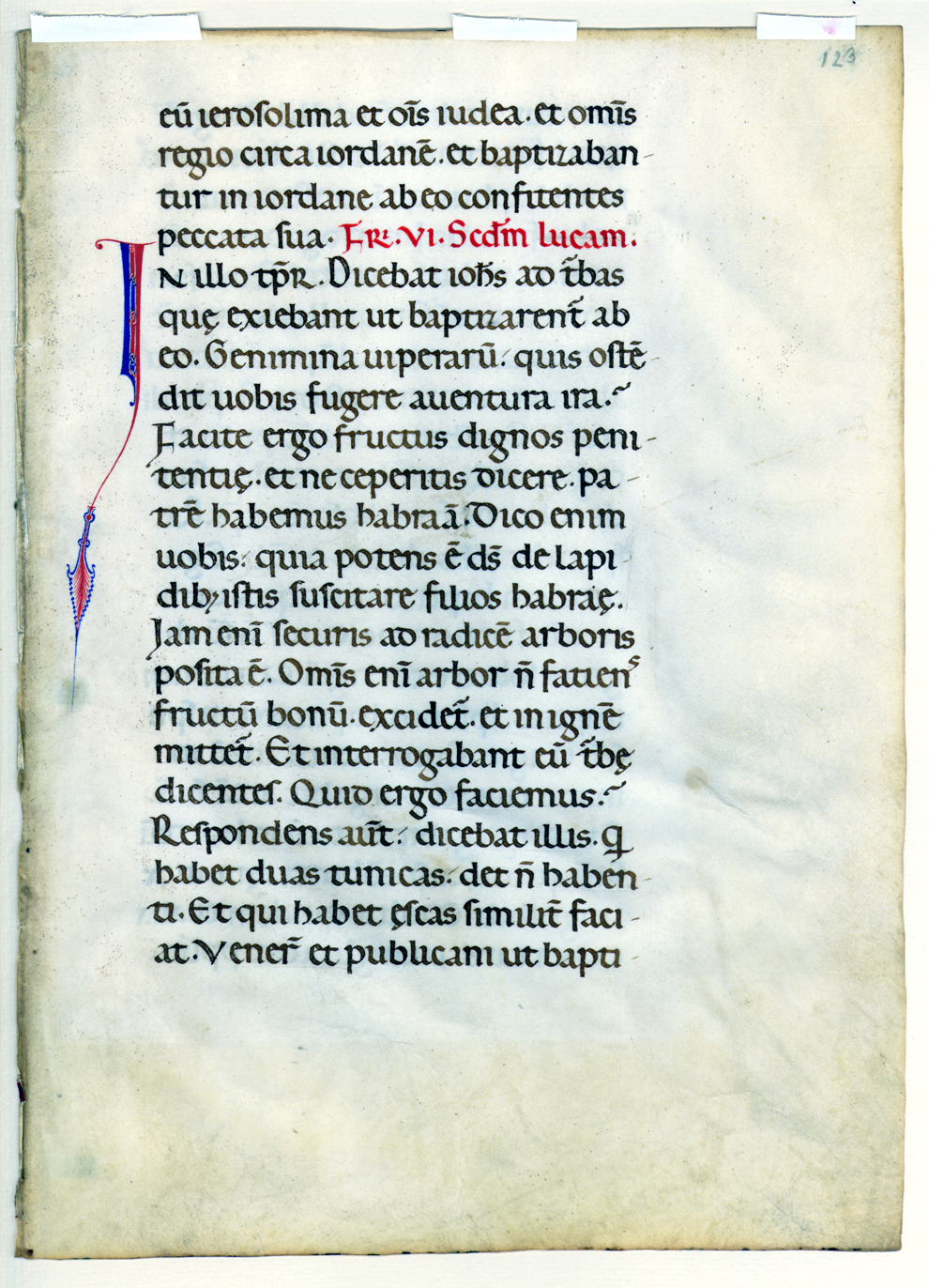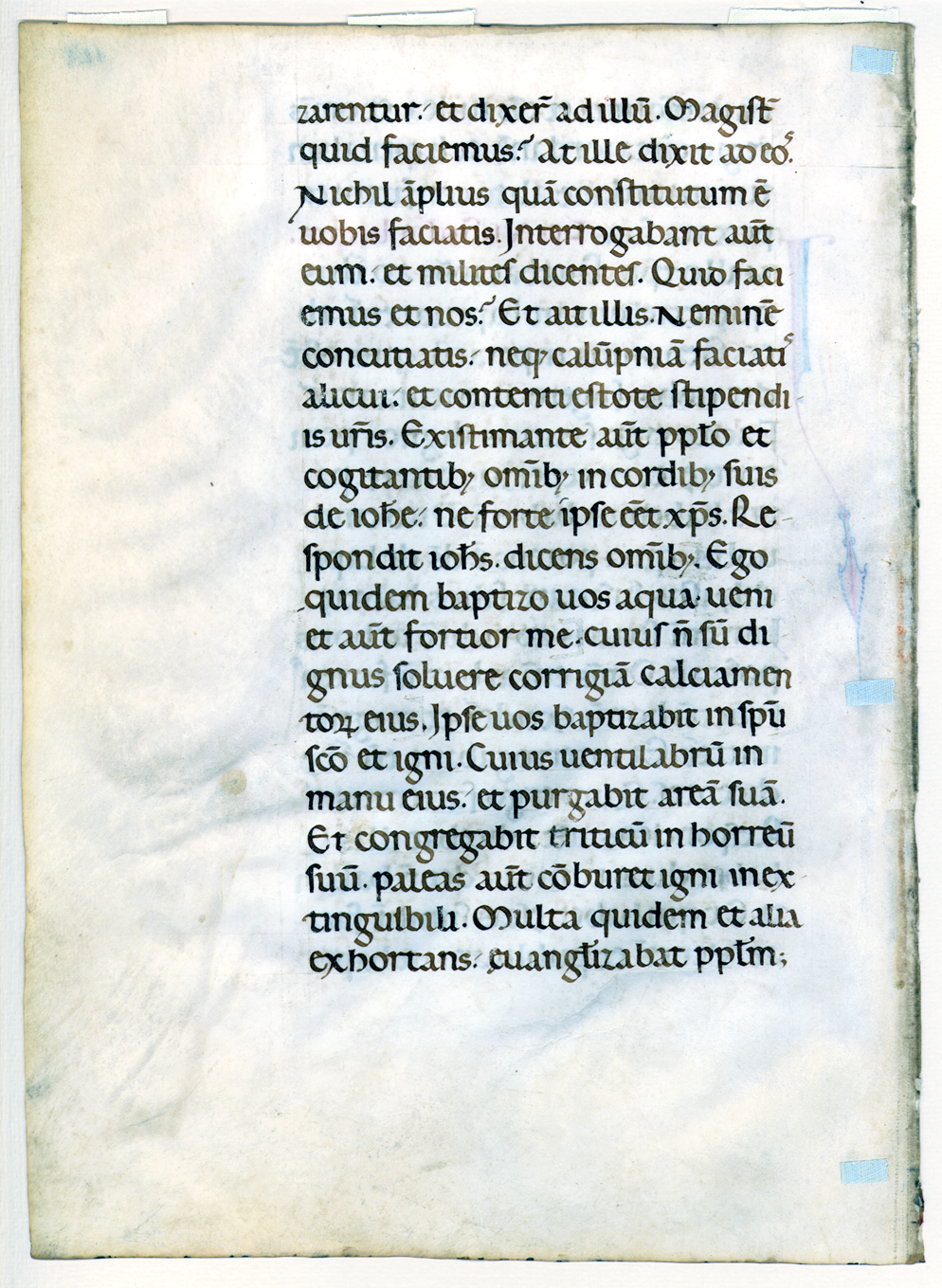Denison University Leaf 03
Otto Ege provided the following description for leaves from this manuscript:
Lectionary (Lectionarium). Italy; Middle 12th Century. Latin Text; Revived Carolingian Script.
A Lectionary contains selected readings from the Epistles and Gospels as well as the Acts of the Saints and the Lives of the Martyrs. These were read by the sub-deacon from a side pulpit. This practice necessitated that they be written in a separate volume, apart from the complete Missal. The fine large book hand shown here, suited to easier reading in a dark cathedral, is a revival of the script developed nearly four centuries earlier in scriptoria founded by Charlemagne. Maunde Thompson calls this Lombardic revival the finest of all European book hands. Even the 15th century humanistic scribes could not surpass it for beauty and legibility.
The tone or hue of ink frequently helps allocate a manuscript to a particular district or century. Ink of brown tone is generally found in early manuscripts, less frequently after 1200 A.D.
Size: 33 x 24 cm
Observations: The vellum is thin, supple, and barely yellowed. There is small evidence of the grain of the animal's fur, made more explicit by enlarging the image, and a few holes remain as evidence of binding. A spot in the left margin of the verso has bled through to the recto, and bleeding through of the text of the recto through to the verso is plain, particularly in the shadow of the large initial "I" which appears in the right margin of the verso side. The text is revived Carolingian minuscule, another example of which can be seen in Leaf 01. The ink is primarily dark brown with minimal fading; one phrase appears highlighted in red, and the initial "I" on line 5 recto is in red and blue. The number "123" appears in the top right corner of the recto.
Text: Matthew 3:5-6 and Luke 3:7-12 (recto); Luke 3:12-18 (verso).
Reconstruction Note! In Ege's original manuscript, this leaf followed what is now Leaf 03 in the Cleveland Public Library portfolio.
 Denison Leaf 03 Recto
Denison Leaf 03 Recto
Denison University Leaf 03 Recto
 Denison Leaf 03 Recto Transcription
Denison Leaf 03 Recto Transcription
eum Jerosólyma, et omnis Judǽa, et omnis régio circa Jordánem; et baptizabántur ab eo in Jordáne, confiténtes peccáta sua. Fr. vi. Sedum Lucam.
In illo tempore. Dicébat ergo ad turbas quæ exíbant ut baptizaréntur ab ipso: Genímina viperárum, quis osténdit vobis fúgere a ventúra ira? Fácite ergo fructus dignos pœniténtiæ, et ne cœpéritis dícere: Patrem habémus Ábraham. Dico enim vobis quia potens est Deus de lapídibus istis suscitáre fílios Ábrahæ. Jam enim secúris ad radícem árborum pósita est. Omnis ergo arbor non fáciens fructum bonum, excidétur, et in ignem mittétur. Et interrogábant eum turbæ, dicéntes: Quid ergo faciémus? Respóndens autem dicébat illis: Qui habet duas túnicas, det non habénti: et qui habet escas, simíliter fáciat. Venérunt autem et publicáni ut bapti-
 Denison Leaf 03 Recto Translation
Denison Leaf 03 Recto Translation
[Matthew 3:5-6]
5 Then went out to him Jerusalem and all Judea, and all the country about Jordan: 6 And were baptized by him in the Jordan, confessing their sins.
Fr. vi. According to Luke.
[Luke 3:7-12]
In that time. 7 He said therefore to the multitudes that went forth to be baptized by him: Ye offspring of vipers, who hath shewed you to flee from the wrath to come? 8 Bring forth therefore fruits worthy of penance; and do not begin to say, We have Abraham for our father. For I say unto you, that God is able of these stones to raise up children to Abraham. 9 For now the axe is laid to the root of the trees. Every tree therefore that bringeth not forth good fruit, shall be cut down and cast into the fire. 10 And the people asked him, saying: What then shall we do? 11 And he answering, said to them: He that hath two coats, let him give to him that hath none; and he that hath meat, let him do in like manner. 12 And the publicans also came...
 Denison Leaf 03 Verso
Denison Leaf 03 Verso
Denison University Leaf 03 Verso
 Denison Leaf 03 Verso Transcription
Denison Leaf 03 Verso Transcription
-zaréntur, et dixérunt ad illum: Magíster, quid faciémus? At ille dixit ad eos: Nihil ámplius, quam quod constitútum est vobis, faciátis. Interrogábant autem eum et mílites, dicéntes: Quid faciémus et nos? Et ait illis: Néminem concutiátis, neque calúmniam faciátis: et conténti estóte stipéndiis vestris. Existimánte autem pópulo, et cogitántibus ómnibus in córdibus suis de Joánne, ne forte ipse esset Christus, respóndit Joánnes, dicens ómnibus: Ego quidem aqua baptízo vos: véniet autem fórtior me, cujus non sum dignus sólvere corrígiam calceamentórum ejus: ipse vos baptizábit in Spíritu Sancto et igni: cujus ventílabrum in manu ejus, et purgábit áream suam, et congregábit tríticum in hórreum suum, páleas autem combúret igni inextinguíbili. Multa quidem et ália exhórtans evangelizábat pópulo.
 Denison Leaf 03 Verso Translation
Denison Leaf 03 Verso Translation
[Luke 3:12-18]
...to be baptized, and said to him: Master, what shall we do? 13 But he said to them: Do nothing more than that which is appointed you. 14 And the soldiers also asked him, saying: And what shall we do? And he said to them: Do violence to no man; neither calumniate any man; and be content with your pay. 15 And as the people were of opinion, and all were thinking in their hearts of John, that perhaps he might be the Christ; 16 John answered, saying unto all: I indeed baptize you with water; but there shall come one mightier that I, the latchet of whose shoes I am not worthy to loose: he shall baptize you with the Holy Ghost, and with fire: 17 Whose fan is in his hand, and he will purge his floor, and will gather the wheat into his barn; but the chaff he will burn with unquenchable fire. 18 And many other things exhorting, did he preach to the people.